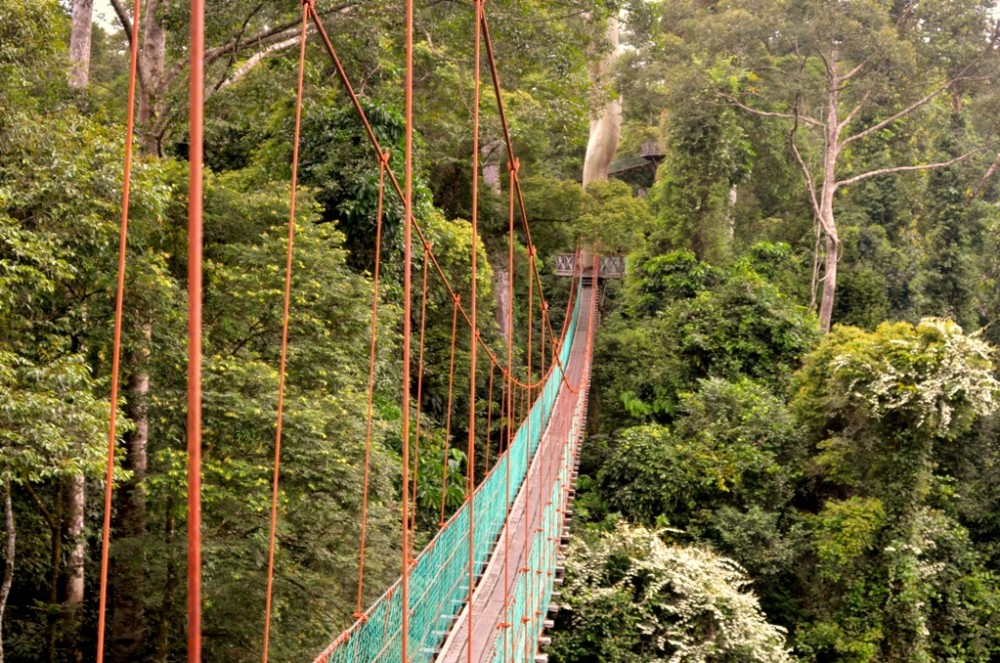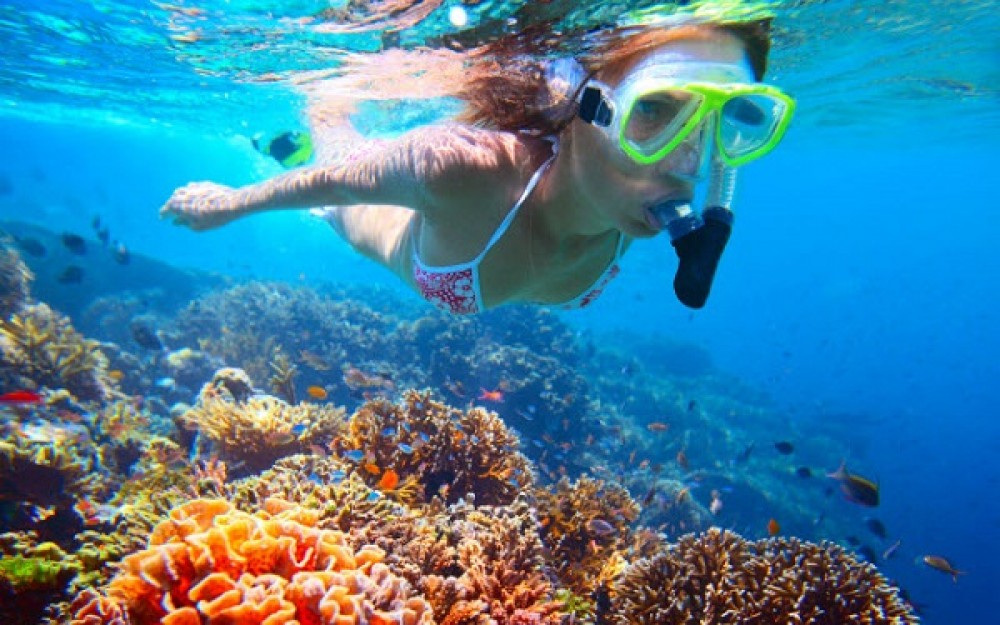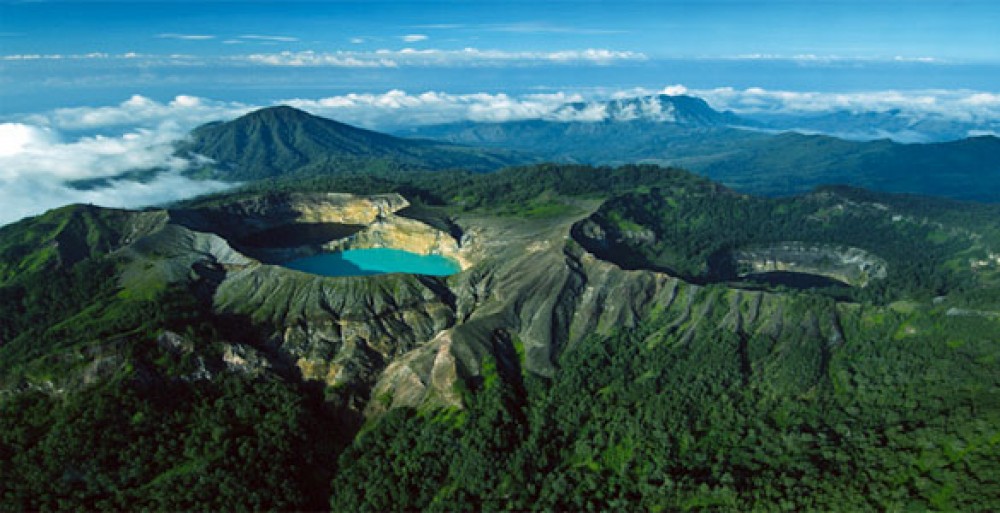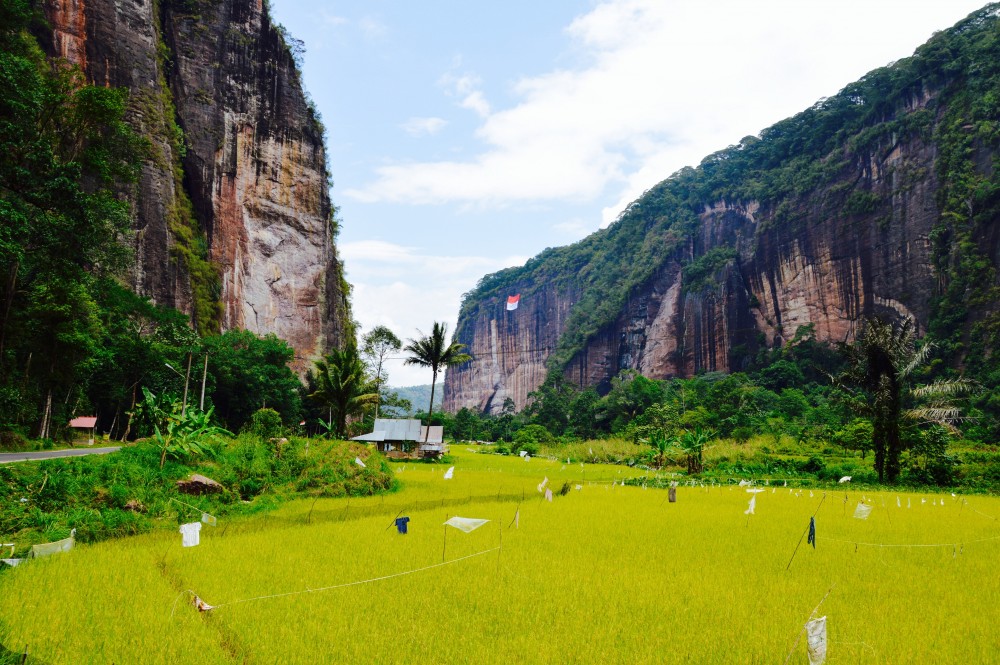With more than 17,000 islands –
ranging from palm-fringed islets to the leviathan bulk of Sumatra – Indonesia's
natural diversity is showcased amid more than 1.9 million sq km straddling the
equator and stretching from the Indian Ocean to the Pacific. Volcanic peaks
rise from lush jungle, the underwater world is revealed in the planet's finest
diving locations, and surprising wildlife ranges from giant reptiles to gentle
denizens of the forest.
Tanjung Puting National Park
 Willdlife watching and
river adventures combine in this massive 4150 sq km park in central Kalimantan, the
Indonesian southern part of Borneo.
Rustic but comfortable river boats travel up the Sungai Sekoneyer, stopping at
orangutan feeding stations during a three-day journey en route to Camp Leakey,
a rehabilitation centre where orphaned and formerly captive orangutans are
trained to live in the wild. Stellar birdlife including darting kingfishers and
regal hornbills is often revealed along the river's banks, and local operators
including Borneo Orangutan Adventure
Tour can arrange private trips on the Sekonyer's signature two-storey teak
houseboats dubbed klotok.
Willdlife watching and
river adventures combine in this massive 4150 sq km park in central Kalimantan, the
Indonesian southern part of Borneo.
Rustic but comfortable river boats travel up the Sungai Sekoneyer, stopping at
orangutan feeding stations during a three-day journey en route to Camp Leakey,
a rehabilitation centre where orphaned and formerly captive orangutans are
trained to live in the wild. Stellar birdlife including darting kingfishers and
regal hornbills is often revealed along the river's banks, and local operators
including Borneo Orangutan Adventure
Tour can arrange private trips on the Sekonyer's signature two-storey teak
houseboats dubbed klotok.
Menjangan Island
 Located just off Bali's northwestern tip, Pulau Menjangan
('Deer Island') is one of Indonesia's most accessible locations for both
experienced divers and adventurous snorkelling fans. The surrounding Bali Barat National Park ensures
protection for twelve different dive sites, and the crystalline waters showcase
sheer walls, caves and a spectacular drop off. Expansive corals and
shapeshifting schools of tropical fish create an underwater ambience akin to
swimming in a giant aquarium – a marine spectacle achievable even by relatively
novice snorkellers. For experienced divers the fascinating 19th-century wreck
of the Anker lies at a challenging depth
of around 50m.
Located just off Bali's northwestern tip, Pulau Menjangan
('Deer Island') is one of Indonesia's most accessible locations for both
experienced divers and adventurous snorkelling fans. The surrounding Bali Barat National Park ensures
protection for twelve different dive sites, and the crystalline waters showcase
sheer walls, caves and a spectacular drop off. Expansive corals and
shapeshifting schools of tropical fish create an underwater ambience akin to
swimming in a giant aquarium – a marine spectacle achievable even by relatively
novice snorkellers. For experienced divers the fascinating 19th-century wreck
of the Anker lies at a challenging depth
of around 50m.
Raja Ampat Islands
 Remote near the northwestern tip of far-flung Papua
Island, the scattered waters of Raja Ampat host the
world's greatest diversity of marine life. Above a translucent ocean, rounded
hills enrobed in tropical forest surround a labyrinth of compact coves and
improbably small islets, providing sublime diversion to the underwater
spectacle. Manta rays and epaulette sharks drift through a technicolour
seascape of pristine coral, while shoals of barracuda and parrotfish patrol the
diverse marine terrain punctuated with underwater walls, peaks and ridges.
Snorkelling, kayaking and birdwatching are all essential attractions for
non-divers, and live-aboard boat cruises – often on Bugis-style heritage
schooners – are the best way to explore Raja Ampat.
Remote near the northwestern tip of far-flung Papua
Island, the scattered waters of Raja Ampat host the
world's greatest diversity of marine life. Above a translucent ocean, rounded
hills enrobed in tropical forest surround a labyrinth of compact coves and
improbably small islets, providing sublime diversion to the underwater
spectacle. Manta rays and epaulette sharks drift through a technicolour
seascape of pristine coral, while shoals of barracuda and parrotfish patrol the
diverse marine terrain punctuated with underwater walls, peaks and ridges.
Snorkelling, kayaking and birdwatching are all essential attractions for
non-divers, and live-aboard boat cruises – often on Bugis-style heritage
schooners – are the best way to explore Raja Ampat.
Kelimutu
National Park
 Best discovered at sunrise after a meandering minibus
journey from nearby Moni,
three intensely coloured volcanic lakes sit atop the summit of Kelimutu on the eastern island of
Flores. Two of the exceptionally deep crater lakes regularly change colour –
driven by the continuous leaching of different minerals – and the indigo smudge
of a Flores dawn illuminates contrasting hues ranging from brown and orange
through to black and red. All the while, Kelimutu's third lake is daubed an
iridescent shade of turquoise, glowing through the half-light slowly revealing
Kelimutu's sparse lunar landscape.
Best discovered at sunrise after a meandering minibus
journey from nearby Moni,
three intensely coloured volcanic lakes sit atop the summit of Kelimutu on the eastern island of
Flores. Two of the exceptionally deep crater lakes regularly change colour –
driven by the continuous leaching of different minerals – and the indigo smudge
of a Flores dawn illuminates contrasting hues ranging from brown and orange
through to black and red. All the while, Kelimutu's third lake is daubed an
iridescent shade of turquoise, glowing through the half-light slowly revealing
Kelimutu's sparse lunar landscape.
Harau Valley
 Easily reached from the Sumatran mountain town of Bukittinggi, the Harau Valley is
fringed by soaring limestone cliffs up to 100 metres high and enlivened by the
Lemba Harau waterfalls. Rock-climbers negotiate careful routes up the cliffs,
while walking trails meander through emerald-green rice paddies to the valley's
quicksilver cascades. Comfortable homestay accommodation in the architectural
style of West Sumatra's Minangkabau people sits amid cooling lotus ponds.
Transport and accommodation for the Harau Valley can be arranged with Lite
'N' Easy Tour in Bukittinggi.
Easily reached from the Sumatran mountain town of Bukittinggi, the Harau Valley is
fringed by soaring limestone cliffs up to 100 metres high and enlivened by the
Lemba Harau waterfalls. Rock-climbers negotiate careful routes up the cliffs,
while walking trails meander through emerald-green rice paddies to the valley's
quicksilver cascades. Comfortable homestay accommodation in the architectural
style of West Sumatra's Minangkabau people sits amid cooling lotus ponds.
Transport and accommodation for the Harau Valley can be arranged with Lite
'N' Easy Tour in Bukittinggi.
Read more on www.lonelyplanet.com